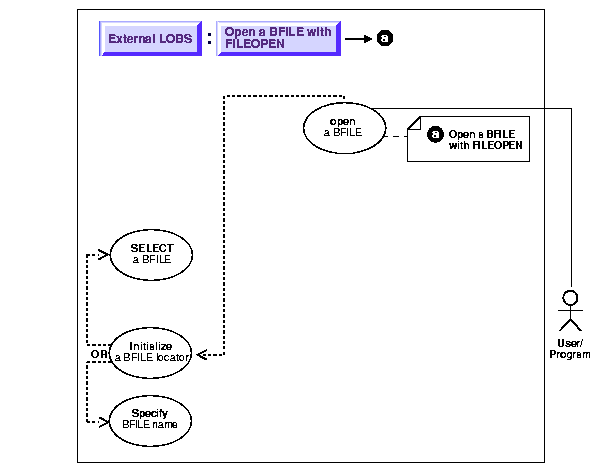Release 2 (8.1.6)
Part Number A76940-01
Library |
Product |
Contents |
Index |
| Oracle8i Application Developer's Guide - Large Objects (LOBs) Release 2 (8.1.6) Part Number A76940-01 |
|
External LOBs (BFILEs), 17 of 41

|
See Also:
"Use Case Model: External LOBs (BFILEs)" for all basic operations of External LOBs (BFILES). |
This procedure describes how to open a BFILE using FILEOPEN.
While you can continue to use the older FILEOPEN form, we strongly recommend that you switch to using OPEN, because this facilitates future extensibility.
See Chapter 3, "LOB Programmatic Environments" for a list of available functions in each programmatic environment. Use the following syntax references for each programmatic environment:
These examples open a Lincoln_photo in operating system file PHOTO_DIR. Examples are provided in the following four programmatic environments:
/* Note that the example procedure openBFILE_procOne is not part of the DBMS_LOB package: */ CREATE OR REPLACE PROCEDURE openBFILE_procOne IS Lob_loc BFILE := BFILENAME('PHOTO_DIR', 'Lincoln_photo'); BEGIN /* Open the BFILE: */ DBMS_LOB.FILEOPEN (Lob_loc, DBMS_LOB.FILE_READONLY); /* ... Do some processing. */ DBMS_LOB.FILECLOSE(Lob_loc); END;
void BfileOpen(envhp, errhp, svchp, stmthp) OCIEnv *envhp; OCIError *errhp; OCISvcCtx *svchp; OCIStmt *stmthp; { OCILobLocator *bfile_loc; /* Allocate the locator descriptor */ (void) OCIDescriptorAlloc((dvoid *) envhp, (dvoid **) &bfile_loc, (ub4) OCI_DTYPE_FILE, (size_t) 0, (dvoid **) 0); /* Set the bfile locator information */ checkerr(errhp, (OCILobFileSetName(envhp, errhp, &bfile_loc, (OraText *)"PHOTO_DIR", (ub2)strlen("PHOTO_DIR"), (OraText *)"Lincoln_photo", (ub2)strlen("Lincoln_photo")))); checkerr(errhp, OCILobFileOpen(svchp, errhp, bfile_loc, (ub1)OCI_FILE_READONLY)); /* ... Do some processing. */ checkerr(errhp, OCILobFileClose(svchp, errhp, bfile_loc)); /* Free the locator descriptor */ OCIDescriptorFree((dvoid *)bfile_loc, (ub4)OCI_DTYPE_FILE); }
|
Note:
At the present time, OO4O only offers |
import java.io.OutputStream; // Core JDBC classes: import java.sql.DriverManager; import java.sql.Connection; import java.sql.Statement; import java.sql.PreparedStatement; import java.sql.ResultSet; import java.sql.SQLException; // Oracle Specific JDBC classes: import oracle.sql.*; import oracle.jdbc.driver.*; public class Ex4_38 { public static void main (String args []) throws Exception { // Load the Oracle JDBC driver: DriverManager.registerDriver(new oracle.jdbc.driver.OracleDriver()); // Connect to the database: Connection conn = DriverManager.getConnection ("jdbc:oracle:oci8:@", "samp", "samp"); conn.setAutoCommit (false); // Create a Statement: Statement stmt = conn.createStatement (); try { BFILE src_lob = null; ResultSet rset = null; rset = stmt.executeQuery ( "SELECT BFILENAME('PHOTO_DIR', 'Lincoln_photo') FROM DUAL"); if (rset.next()) { src_lob = ((OracleResultSet)rset).getBFILE (1); src_lob.openFile(); System.out.println("The file is now open"); } // Close the BFILE, statement and connection: src_lob.closeFile(); stmt.close(); conn.commit(); conn.close(); } catch (SQLException e) { e.printStackTrace(); } } }
|
|
 Copyright © 1996-2000, Oracle Corporation. All Rights Reserved. |
|